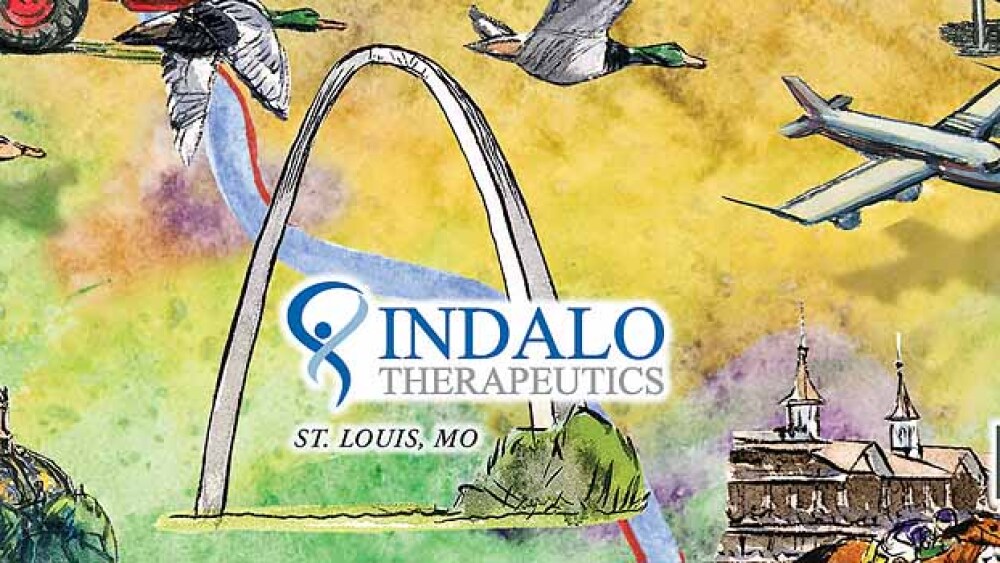Indalo Therapeutics is based in St. Louis and was formed in October 2016 from the merger of Antegrin Therapeutics and Cascadia Therapeutics.
Indalo Therapeutics is based in St. Louis and was formed in October 2016 from the merger of Antegrin Therapeutics and Cascadia Therapeutics. The focus of the company is on the development of therapies to treat fibrotic diseases.
Antegrin had a portfolio of small-molecule integrin antagonists, whereas Cascadia had the management experience of its co-founders, Williamson Bradford and Scott Selwert. They both were executives at InterMune where they were involved in the development of Esbriet (pirfenidone) for idiopathic pulmonary fibrosis and ultimate sale of the company to Roche in 2014.
“The creation of Indalo from the merger of Antegrin and Cascadia results in a leading biotechnology company poised to tackle some of the most complex challenges in fibrosis,” Indalo’s chairman of the board, Rajesh Devraj, said in a statement at the time of the company’s formation. “Indalo is built on cutting-edge scientific innovation, diverse intellectual property estates, and a stellar executive team with deep knowledge of anti-fibrotic drug development.”
Company Leadership
Williamson Bradford – Chief Medical Officer. A co-founder of Cascadia Therapeutics, he was recently the Chief Medical Officer of Moerae Matrix, and Senior Vice President of Clinical Development at InterMune. He also held positions at IntraBiotics Pharmaceuticals and Genentech.
Scott Seiwert — Chief Scientific Officer. Most recently, Seiwert was Senior Vice President of Research and Technical Development at InterMune. He was also a scientific co-founder of Alios BioPharma, which sold to Johnson & Johnson.
Karl Kossen — Senior Vice President of Translational Science. Previously Vice President of Disease Biology at InterMune, he also co-founded Blade Therapeutics and served as its Senior Vice President of Biology.
Ramachandran Radhakrishnan – Senior Vice President of Pharmaceutical Development. He was previously Vice President of Pharmaceutical Product Development at InterMune.
George Capps — Vice President and Head of Business Operations. Capps was previously director of Business Operations at Vasculox, now Tioma Therapeutics and Director of Business Development at Mencuro Therapeutics.
Company Financing
On Aug. 3, 2017, Indalo announced it had raised $9 million of a $26 million equity round. The funding was provided by BioGenerator, iSelect Fund, and other investors.
Pipeline
When Antegrin and Cascadia merged, they had a portfolio of novel small molecules that bind to targeted integrins with high potency and selectivity. The portfolio includes orally bioavailable compounds that broadly target RGD-binding integrins central to fibrotic responses.
The company indicates that many of the compounds have shown strong activity in preclinical models of renal, hepatic, pulmonary, pancreatic, muscular, and surgical implant fibrosis.
Market Competition
Because fibrosis is such a general term, there are many companies focusing on various types of fibrosis. Examples include Promedior, Pliant Therapeutics, La Jolla Pharmaceuticals, Galectin Therapeutics, and Reata Pharmaceuticals. The big companies such as Roche, Allergan and Bristol-Myers Squibb have also shown an interest over the years in fibrosis as well.
What to Look For
Although the company declined to be interviewed for this profile, when it was formed in 2016, it indicated it expected to initiate IND-enabling activities in 2017 and begin its first human study in early 2019.
See Top Life Science Startups 2018
See Top Life Science Startups 2017
See Top Life Science Startups 2016
See Top Life Science Startups 2015





